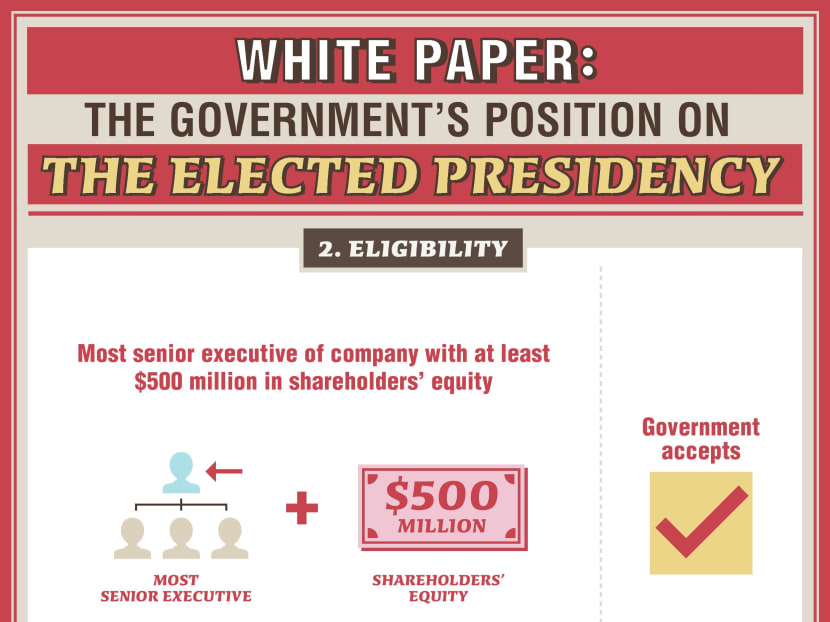Elected Presidency: Higher eligibility criteria accepted, but Govt says no to longer qualifying terms
SINGAPORE — The Government has largely accepted the recommendations on the eligibility criteria for private-sector candidates, including increasing the S$100 million paid-up capital threshold to S$500 million in shareholders’ equity, and requiring that the candidates have held the most senior executive position in the company.

The Government has agreed with the Constitutional Commission to raise the eligibility criteria for private sector candidates to the most senior executive of company with at least $500 million in shareholders’ equity. Photo: MCI
SINGAPORE — The Government has largely accepted the recommendations on the eligibility criteria for private-sector candidates, including increasing the S$100 million paid-up capital threshold to S$500 million in shareholders’ equity, and requiring that the candidates have held the most senior executive position in the company.
But several proposals for candidates from the public sector were not fully taken on, such as retaining the Auditor-General and Accountant-General posts on the list despite the recommendation made by the Constitutional Commission to remove them.
Laying out the Government’s response in a White Paper released on Thursday (Sept 15), the Government said they agree in principle with the commission’s views and main recommendations. But on areas where they differ, the Government decided to adopt an alternative approach.
For applicants from the private sector, the Government agreed with the recommendation that shareholders’ equity, rather than the paid-up capital, was a better measure of a company’s size and complexity.
The corresponding threshold will also be set at S$500 million, up from the previous S$100 million paid-up capital threshold, as recommended by the commission. This will be reviewed periodically to keep pace with changes in the economic environment.
In making its proposals, the commission had noted that the President has to face realities of scrutinising huge potential drawdowns and must possess the confidence that comes with the familiarity of making
decisions that involve large sums of money.
The Government added in the White Paper that the size of the Government reserves, which the President holds the “second key” to, has also grown over 25 years. As a result, the weight of the President’s job has also increased.
But for the length of tenure applicants must have held in both private and public offices, the Government is retaining the current qualifying tenure of three years instead of the recommended six years.
While they agree that it is important that applicants are required to have spent “adequate time” in a qualifying office, the Government said the precise minimum duration to be set is “ultimately a question of balance”.
“Given the concurrent changes to other aspects of the eligibility criteria, the Government prefers to adopt a cautious approach, and retain the qualifying tenure at three years at this time,” they said.
To that end, the Government added that as the length of tenure will remain at three years — which is shorter than the suggested six years — an applicant can, at most, combine two separate periods for which they held relevant offices, and each period should not be less than a year.
Likewise, while they agreed with the recommendation to introduce a new requirement to ensure that the applicant’s experience is current, they preferred to “proceed cautiously” on exact “look back” duration as it is a new condition.
An applicant’s qualifying tenure should then fall wholly or partly within 20 years of the relevant Presidential Election instead of the recommended 15-year period, they noted.
Speaking to reporters on the sidelines of a dialogue — held at ITE College East — on the proposed changes to the Elected Presidency scheme, Law Minister K Shanmugam pointed out that the commission’s recommendations on the qualifying tenure, taken as a whole, may be “too drastic”.
“You got to have six years of experience, (and) within nine years he should stand for the presidency. We think that might narrow down the field too much,” he said.
He added: “A person who has been in a top job for three years would have had to do a number of things in the private sector before he reaches that level. So there would be substantial experience, there should be.”
Specific to the public sector, the Government also decided to keep the offices of the Account-General and the Auditor-General on the list of public-sector offices that qualify, despite the commission’s recommendation to remove them.
While the commission noted that it was appropriate to remove them as these officeholders play ancillary and comparatively narrower roles, the Government said they would like to consider this recommendation more carefully, and if both offices should be removed in future.
The Government also plans to have a uniform qualifying framework for all key statutory boards or Government companies listed under the Fifth Schedule of the Constitution, such as the CPF Board, Monetary Authority of Singapore, Housing and Development Board, GIC and Temasek.
This means that the threshold for these entities will be adjusted to S$500 million and those who hold the most senior executive position in these companies should also qualify for Presidential office.






